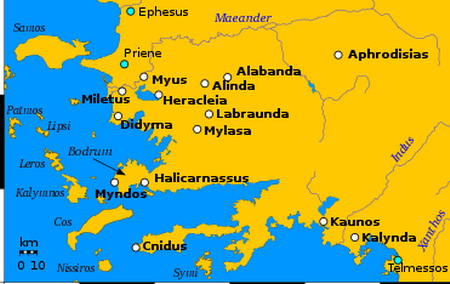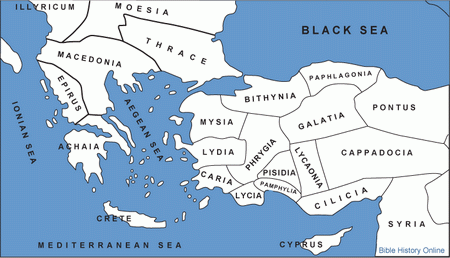Bellerophon and Joshua,
The Conquest Left Incomplete
by John R.
Salverda
The next group of enemies that
Bellerophon was sent to clear out was the pirates of the Carian coast.
Cities of Caria in White

|
The
origins of the Carian people was just as much a mystery to the ancients as it
is to historians today. Herodotus was able to trace them back to the time when
they served as sailors for the fleet of King Minos of Crete. We have seen that
the Minoans were originally from Phoenicia, descendants from Europa the maiden
of Phoenicia. The Carians were often associated with the sea faring
Phoenicians and there were even at least two cities in the land of Caria named
for the Phoenicians, Phoinix and Phoinikus. The Carians were famously known to
the Greeks as pirates of the Mediterranean Sea, in fact the Egyptians called
the Mediterranean Sea, "the sea of Kharu," presumably, the "Carian" Sea. If it
was one of the tasks of Bellerophon to dispel the Carians, and Bellerophon was
Joshua, then the Carians must have been one of the peoples of Canaan, such as
the Hurrians. In his greatest historical work, a book called, "Ages in Chaos"
the heretical genius Immanuel Velikovsky identifies the Carians with the
Hurrians, and in the light of his reconstruction of ancient history he leaves
little doubt but that he is correct. As Velikovsky has told us, the Assyrian
cuneiform texts referred to the Hurrians as the "Khurri" and in the Egyptian
chronicles they were called the "Kharu." The Hurrians are not mentioned in the
Scriptures, but many historians identify the Horites with the Hurrians and
while Velikovsky does make a distinction between the two groups, it should be
pointed out that the Septuagint calls the Horites the "Chorreans."
Furthermore, if the Horites can be identified with the Hurrians, then so can
the Hivites and also the Jebusites of Jerusalem, also called "Uru-salim," (Hurrian
Salem') in the El-Amarna correspondences.
Provinces of Greece and Asia Minor

|
Just because the Hurrians are not called by that name in the
Scriptures is no reason to doubt their coexistence with the Hebrews, for
archaeologists have found evidence of the Hurrians all over the promised land,
(Abraham himself is said to have hailed from "Ur" of the Chaldees, presumably
the Chaldians of Armenia where the Hurrians are also said to have come from.
Furthermore, the city of Harran, where Abraham lived for some time before he
moved to the land of Canaan, has been shown to be of Hurrian foundation.) and
after all, the Scriptures don't seem to know about the Phoenicians by that
name either. The Scriptures do mention the Carians as a troop of bodyguards to
the kings of Judah, in the Scriptures the Carians are referred to as the "Cherethites,"
these served as the bodyguard to King David (2Ki. 11:4, 13-16, 19 see also
2Sam. 8:18). In the Greek Septuagint the term "Cretans" is substituted for "Cherethites,"
which brings us back to the statement made by Greek Herodotus so saying that "Carians"
served King Minos of Crete. The Egyptian kings Psammetichus and Amasis used
Carian mercenaries and the Carians also formed the bodyguard for the kings of
Lydia.
The end of the myth about Bellerophon's battles in Lycia, is
the story about the overthrow of the Lycians themselves. Luz was the Canaanite
name for the city that was known to the Hebrews as Bethel. It was the warriors
of the House of Joseph who were specifically accredited with overthrowing the
Canaanites of Luz. This corresponds to the Greek myth because it was
Bellerophon of the house of Sisyphus who defeated the Lycians, and this is in
keeping with the theory that Sisyphus was the Greek equivalent to Joseph.
At this point we may be able to tell how these Canaanites
came to be known to the Greeks as the Lycians of Lycia, despite the common
transliteration from the Greek as "Lykia," the name of the nation in Asia
Minor is pronounced "lish'ee-ah." Although the Greeks had their own various
versions concerning the founding of Lycia, (The bulk of opinion makes Lycia to
be founded by Phoenicians through Europa's son Sarpedon.) the Scriptural
account about the fall of Luz may hold a more satisfying explanation. In the
book of Judges chapter 1, verses 22 through 26, we see that the House of
Joseph made a deal with one of the Luzians. If the unnamed man would turn
against his own city and show the Hebrews the way in, then the Josephites
would deal mercifully with him and his family. And so it was, the man wisely
consorted with the Israelite enemy and was allowed to take his family out from
the doomed city of Luz and they got away unharmed. Then the scriptural account
goes on to say how he took his family to the "land of the Hittites," where he
set up a colony from, and named it after, his recently destroyed homeland,
Luz. While the promised land was sometimes known as the land of the Hittites,
it was only a part of the vast Hittite empire, the bulk of their kingdom, and
the land of their nativity, was in Asia Minor. Since the promised land of
Canaan was being taken away from the Hittites and given to the Israelites, it
doesn't seem likely that the new Luz should be set up, as some have suggested,
at another location within the land of Canaan. Therefore the designation,
"land of the Hittites," at verse 26 of the Scriptural account, is most
probably referring to the Hittites of Asia Minor, where in deed, the land of
Lycia did end up being located. Now, while the Greek myths have Bellerophon
making his deal with the king of Lycia, whom they called by the very Semitic
looking name, "Iobates," there is no indication in the Scriptures that the
unnamed traitor at Luz was it's king. However, if Iobates was the traitor at
old Luz, then he was also the founder of it's replacement colony in the land
of the Hittites, which would, of course, qualify him as the preeminent king of
the new place. This scenario may also help to explain why the Greeks would
call the king of Lycia "Iobates" for generation after generation, because it
was not unusual for the name of founding, or otherwise exemplary, kings to
leave their name as an hereditary title to subsequent regents, examples of
this practice may be seen in the cases of Gordius and Midas, famous kings of
the neighboring kingdom of Phrygia.
Joshua and the Hebrews did not wipe out all of the
Canaanites, at first with divine assistance, they were quite successful
against the Canaanites but then, even though they had God on their side, they
began to make deals with the enemy, the interloping Israelites intermarried
with the Canaanite nations and even left them with sovereignty in many cases.
The case of Bellerophon was quite comparable in this regard for he also fought
successfully against the Lycians but then their king, seeing that Bellerophon
had the gods on his side, sued for peace, and allowed the hero to marry into
the Lycian royal family, giving him only half of the Lycian kingdom while the
king was able to retain sovereignty in the remainder. It is perhaps because of
this incomplete conquest of Canaan that Ezekiel was forced to lament about
Jerusalem, "' Thy birth and thy nativity is of the land of Canaan; thy father
was an Amorite, and thy mother an Hittite." (Eze. 16:3) Looking back we have
to admit that the racial "impurities" of Israel are like a labyrinth that is
impossible to straighten out. Abraham can be associated with the Hurrians as
well as the Chaldeans. The Amorites of Babylon are called Canaanites, and the
Chaldeans have been identified with the Hittites by Velikovsky. The Hittites
are said, by modern historians, to have adopted the religion of the Hurrians
(such as their mother goddess, Hebat who has in turn been identified with
Eve). The kings of Assyria refer to the Kings of Israel as "the King of the
Hittites." King David himself is the direct descendant of Rahab the Canaanite
prostitute of Jericho, and of Ruth the "Moabitess." The Ishmaelites are the
Midianites are the Kenites are the Cushites. Moses himself (the supposed
institutor of monogamy) married a Cushite woman and their descendants became
the priesthood of the widely roving Danites (If you are a "Dane" then perhaps
you have a mole or a freckle that reflects this last fact.). Therefore I would
strongly appeal to those of us who would attempt to Identify "lost" Israelites
based upon their ethnicity or racial makeup to reconsider the strategy
completely. There are no "pure" Israelites, for both the Hebrews and the
Greeks report that the conquest of Canaan, or "Lycia," as it's referred to in
the "myths" of the Greeks, was incomplete, you can blame Joshua, or as the
Greeks seem to have called him, Bellerophon.
For more articles by John R. Salverda on the Hebraic
Connections of Greek Mythology, see:
"Helleno-Yishurin. The Hebrew Origin of Greek Legends"
Join the Brit-Am Ephraimite Discussion Group
Just Send an
e-mail
with "Subscribe"
in the Subject Line
Main Page
Offerings and Publications
Return to
Question and Answer
Table of Contents